Freedom Isn’t Free: A Not-So-Drunken Commentary Track for Three Colors: Blue
 This commentary track deals with a handful of themes: the blunt use of color contrasted with the almost tangential way the movie deals with its ostensible theme of liberty; the use of visual and aural cues to indicate the subjective nature of the film; Julie’s progression from isolation to active engagement with the world; and the relationship between the concept of “freedom” and Kieslowski’s obvious interest in responsibility. Plus, I call Juliette Binoche a “two-faced bitch.” How can you resist?
This commentary track deals with a handful of themes: the blunt use of color contrasted with the almost tangential way the movie deals with its ostensible theme of liberty; the use of visual and aural cues to indicate the subjective nature of the film; Julie’s progression from isolation to active engagement with the world; and the relationship between the concept of “freedom” and Kieslowski’s obvious interest in responsibility. Plus, I call Juliette Binoche a “two-faced bitch.” How can you resist?

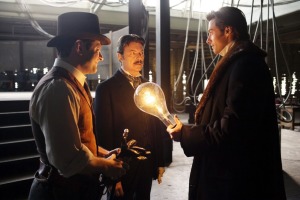 The reasons for recording (with Bride of Culture Snob) this commentary track to The Prestige are many and simple:
The reasons for recording (with Bride of Culture Snob) this commentary track to The Prestige are many and simple: 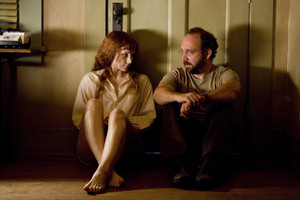 Why oh why did I assent to River Cities’ Reader film critic Mike Schulz’s inebriated suggestion that we record a commentary track for Lady in the Water?
Why oh why did I assent to River Cities’ Reader film critic Mike Schulz’s inebriated suggestion that we record a commentary track for Lady in the Water? When we say that a movie is more style than substance, we typically mean it derisively. Oliver Stone’s JFK has a ton of stuff – with the director’s cut running nearly three and a half hours – that was mistaken for its substance. But the meat of the movie is its style, because it’s the fuel that made the film so combustible.
When we say that a movie is more style than substance, we typically mean it derisively. Oliver Stone’s JFK has a ton of stuff – with the director’s cut running nearly three and a half hours – that was mistaken for its substance. But the meat of the movie is its style, because it’s the fuel that made the film so combustible.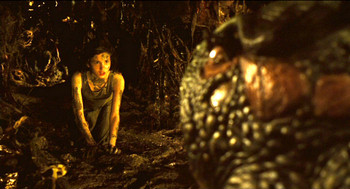 In a
In a  In honor of the final episode of The Sopranos, Culture Snob takes a look at five minutes from The Wire – a show that probably wouldn’t exist were it not for that crime family from Jersey. This brief audio commentary – part of the “Five Minutes” series – looks at one scene from The Wire’s first season. In these five minutes, the only dialogue that passes between Baltimore Police detectives Bunk and McNulty are variations on the word “fuck” and one utterance of “pow,” but the audience pieces together how this particular murder went down through visual storytelling and acting devoid of meaningful words.
In honor of the final episode of The Sopranos, Culture Snob takes a look at five minutes from The Wire – a show that probably wouldn’t exist were it not for that crime family from Jersey. This brief audio commentary – part of the “Five Minutes” series – looks at one scene from The Wire’s first season. In these five minutes, the only dialogue that passes between Baltimore Police detectives Bunk and McNulty are variations on the word “fuck” and one utterance of “pow,” but the audience pieces together how this particular murder went down through visual storytelling and acting devoid of meaningful words.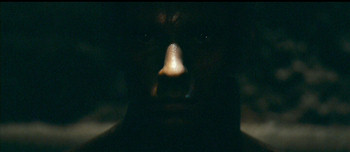 The contradictions of director/co-writer/composer Tom Tykwer’s Perfume: The Story of a Murderer start in the title, with the onomatopoeic softness and ether of a single word paired with a morbid, blunt descriptive subtitle. Both components are drawn from the novel by Patrick Süskind, but the associations that pile up and pull at each other during the movie’s opening scenes are equally Tykwer’s, cinematic and lovingly ambiguous.
The contradictions of director/co-writer/composer Tom Tykwer’s Perfume: The Story of a Murderer start in the title, with the onomatopoeic softness and ether of a single word paired with a morbid, blunt descriptive subtitle. Both components are drawn from the novel by Patrick Süskind, but the associations that pile up and pull at each other during the movie’s opening scenes are equally Tykwer’s, cinematic and lovingly ambiguous.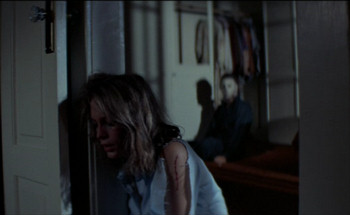 With Rob Zombie’s remake in theaters this weekend, I thought it would be a good opportunity to explore why Michael Myers (or “The Shape”) worked so well in John Carpenter’s 1978 movie Halloween.
With Rob Zombie’s remake in theaters this weekend, I thought it would be a good opportunity to explore why Michael Myers (or “The Shape”) worked so well in John Carpenter’s 1978 movie Halloween.